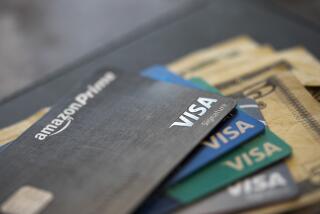STRESSED OUT
- Share via
In good economic times and in bad, we like our vices.
In boom times, drunk-driving rates, alcohol-related illnesses and spending on alcohol all increase.
Since the economy went south, consumers have cut back on drinking in restaurants and bars but are spending more on alcohol to drink at home, according to Mintel International, a Chicago-based market analysis firm.
In 2008, the sale of alcohol to be quaffed at home reached $77.8 billion, an increase of 32% in 2008 over the 2003 level, Mintel estimates.
Over the next five years, spending on alcohol to be consumed at home will increase 5% annually, while drinking at bars and restaurants will decline by 2% this year and 1% yearly after that, Mintel projects.
The connection between hard times and hard drinking isn’t clear. In the U.S., a state’s alcohol consumption declined by 3% for every 1 percentage point increase in that state’s unemployment rate, according to one study. Hard drinkers cut back, but light drinkers consume more. But another study found that rates of binge drinking went up 8% when unemployment rose 5%. The increase in binge drinking was concentrated most heavily among adults who were still employed.
The unemployed are more likely to decrease their alcohol consumption.
A UCLA researcher has estimated the current economic downturn’s effect on drinking as follows: In California, between January 2008 and January 2009, unemployment rates increased from 4% to 10.1% (nationally, from 4.8% to 8.1%). The study estimates that during this economic decline, those who drink alcohol will consume 12% less (10% less nationally), there will be a 13% reduction in alcohol-impaired driving, and a 1.2% decrease (1% nationally) in the number of people who drink at all. The probability of being a heavy drinker (consuming 60 or more drinks per month) is predicted to decline in California by 31%.
-- Melissa Healy
--
Sources: A 2000 article in the Quarterly Journal of Economics, and a 2008 study by the Swedish Business School at Orebro University; “Mintel expects strong ‘sin stock’ markets during economic downturn,” Mintel International, Chicago; a 2002 study in the Journal of Health Economics; a 2001 study in Health Economics; a 1997 study in Social Science & Medicine; Andrew Barnes, UCLA School of Health Services.
More to Read
Inside the business of entertainment
The Wide Shot brings you news, analysis and insights on everything from streaming wars to production — and what it all means for the future.
You may occasionally receive promotional content from the Los Angeles Times.











